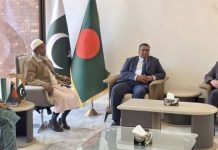ISLAMABAD, SEPT 20 (DNA) – COMSTECH has joined hand with SAWiE, to address the climate change crisis affecting livelihood of millions of smallholder farmers in OIC member states. To achieve this milestone, a Memorandum of Understanding (MoU) between COMSTECH and SAWiE was signed online.
Addressing to the MoU signing ceremony, Prof. Dr. M. Iqbal Choudhary, Coordinator General, COMSTECH, said, it is a matter of urgency to tackle climate change crisis. The entire OIC world including Pakistan are facing the dire water shortage. Pakistan is an agriculture economy with over 40% population employed in the agriculture sector. The agrarian sector contributes more than 20% in the GDP, and it is dominated by smallholder farmers — 90% farmers with less than 12.5 acres.
Dr. Choudhary said that the collaboration with SAWiE will help develop sustainable agriculture solutions to achieve improved food quality by supporting smallholder farmers through knowledge-based farm advisory. He said, this collaboration will develop capacity in agriculture supply chains, addressing food security, and improving income of OIC member states.
Ms. Nosheen Ramzan, Chairperson SAWiE said “linking research with the agriculture industry not only benefits the economy but also addresses societal grand challenges of climate change, food security, nutrition, healthy environment, and healthy planet”.
She said, new innovation contributes towards achieving sustainable agriculture solutions through net zero emissions. This collaboration will address food security & help smallholder farmers. She mentioned that this has a direct link with the achievement of United Nations sustainable development goals (SDGs).
SAWiE uses open source earth observation data sets from European Space Agency and its community platform of farmer’s network to help smallholder farmers to choose suitable time of sowing, irrigation application, pests and disease control measures and harvest planning to fetch better prices. COMSTECH plans to work with SAWiE to popularize these applications in OIC region in different languages.
The partnership entails sharing knowledge, developing collaborative projects, and organizing capacity building events of stakeholders in OIC member states.=DNA
====================












